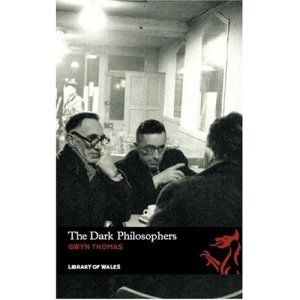 The Dark Philosophers (1946)
The Dark Philosophers (1946)
Gwyn Thomas
Library of Wales, 295pp
Foreword by Elaine Morgan
In 2006 the Library of Wales was set up to reprint classics of Anglo-Welsh fiction, which is Welsh fiction written in English. The aim was to bring much neglected Welsh fiction back to the public, and included such authors as Geraint Goodwin, Dorothy Edwards, Ron Berry and Gwyn Thomas. I would summarise the history of English language Welsh fiction, but poet Owen Shears did it so well in The Guardian I will link you directly to his article.
As a writer, and a writer of Anglo-Welsh fiction, I have looked to these novels, and other novels about Wales, as guides, inspirations and mirrors. As a young man I read writers who took directly from those men reprinted by the Library of Wales – Niall Griffiths owes a debt to Ron Berry, for instance – and then for a decade or so I struggle to reconcile my cultural identity with my physical identity and my national identity. I was born in England, I speak English, I have lived in Wales my whole life and write about Wales. But then there is another disparity – many of these Welsh writers write about a different Wales to the one I know. Raymond Williams, in Border Country, wrote about borderland country, much as Bruce Chatwin did in On The Black Hill, there was Dylan Thomas with his valleys and his moonless nights in small towns, but South Walian towns. I am a writer of the North, a different Wales, but still indebted to that image of the South. Gwyn Thomas is of that South too. His trio of short works that constitute The Dark Philosophers show this familiar Wales, the image of Wales known elsewhere, the Wales of coal mines and slate pits and black mountains.
Oscar is the first of the works, and it is a morbidly funny tale of drunkenness, poverty, the valleys and sex. It presents the wit Thomas was known for: “If it was water that Oscar drank, he’d be full of fish.” You can sense the dank, dark mountains leaning over this village, and on which Oscar lives, rich and dominant and hated. One knows this is a tale that can only end badly. The Dark Philosophers, the second tale, seems to be going nowhere. The characters are as rich as anything Thomas produced, and they all meet in an Italian cafe, full of smoke, to discuss finer things, to scheme, and to laugh as friends. Outside it is another dingy valley, with another man on the hill, another man deserving of hate. The final moment twist makes everything deliciously exquisite. The final story is Simeon, a bleak of tale of suggested incest and murder, and though the shortest of the pieces packs the biggest emotional punch.
The reason for Gwyn Thomas’s loss to the modern canon of British fiction – for he is surely as deserving to be there as that other Thomas of Wales – has been attributed to numerous factors: the impossibility of categorising him, the too-broad spectrum of his work (novelist, playwright, non-fiction, and broadcaster), or the length of his career (The Dark Philosophers was 1946 and his last work was forty years later). In his day, though, he was as famous as Dylan and had cult following in America. The Library of Wales’s reissue of this work should have seen his status renewed, for The Dark Philosophers is a masterpiece of British fiction, but outside of Wales I do not think his work has travelled. In his article for The Guardian Owen Shears speaks to the acceptance of knowledge of Irish fiction outside of Ireland, but that Welsh fiction has not been afforded the same attention – whether this is because of the lack of familiarity to non-Welsh readers of Welsh situations, or because, as Shears quoted in his article: “The tragedy of the Welsh”, George Borrows wrote in his 1854 travel book Wild Wales “is that they will never forget they were conquered by the English but the English have already forgotten.” So is the inherent tragedy seen by Welsh readers missed by English ones? And if so, is this inherent tragedy localised just to fiction of a certain era (1940s – 1980s)? Recently there has been a spate of Anglo-Welsh novels (not all by Welsh writers, such as Susan Fletcher with Eve Green) that has explored this diaspora and they have seen commercial and critical success. There are still, though, many more Welsh novels that do not see success outside of Welsh borders, many of them published by the Welsh presses that arose in the 1980s and became confident publishers in the 1990s and 2000s, such as Seren, Gomer, Y Lolfa and Alcemi, and who publish novels with global themes (such as Chris Keil’s Liminal, previously reviewed on these pages) but who are categorised as “Welsh Novels”. Perhaps we would be better served by a refutation of labels, but then where would there be allowance of exploration of national themes?
I will be considering these questions in more thought as I read more of the Library of Wales’s works. In what was supposed to be a review of Gwyn Thomas’s The Dark Philosophers, I have been forced into considering deeper questions of cultural identity and heritage, and of emotional transference and acceptance, and for one novel to have provoked such discussion I think is a testimony to the power of Thomas’s novel. A truly brilliant piece of work, and any writer who calls his work “Chekhov with chips” deserves to be read.